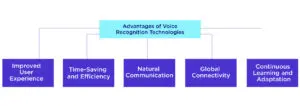Voice recognition technologies are transforming how we interact with devices, businesses, and each other. From personal assistants like Siri and Alexa to sophisticated systems used in healthcare and law enforcement, voice recognition is becoming an indispensable part of our daily lives. But what exactly makes it so important? Let’s explore its uses and advantages to understand why it matters so much.
The Role of Voice Recognition in Modern Life
Voice recognition technologies have progressed significantly in recent years. They make it possible for machines to recognize, comprehend, and react to human speech. These systems are no longer limited to basic commands; they now support nuanced conversations, making interactions more natural and intuitive.
Voice recognition is crucial because it bridges the gap between humans and machines, making technology accessible to everyone, including those who may struggle with traditional input methods like typing or swiping. This democratization of technology has widespread implications for industries ranging from education to e-commerce.
Key Uses of Voice Recognition Technologies
- Enhancing Personal Convenience
Voice recognition systems are widely used in smart devices to simplify daily tasks. You can set reminders, play music, or control home appliances using just your voice. These features save time and effort, providing seamless integration into modern lifestyles.
- Empowering Accessibility
For individuals with disabilities, voice recognition technologies serve as a lifeline. People with limited mobility or visual impairments can use these tools to communicate, navigate the internet, or control devices, making their lives more independent and manageable.
- Boosting Workplace Efficiency
In workplaces, voice recognition enhances productivity by enabling hands-free operations. Transcribing meetings, creating reports, and managing schedules are faster and more accurate with these tools. Many industries, including healthcare, rely on voice recognition for precise documentation.
- Revolutionizing Customer Service
Many companies use voice recognition in their customer service channels. Automated voice systems can understand queries, provide relevant answers, and even route complex issues to human agents. This enhances client happiness and cuts down on wait times.
5. Strengthening Security
Voice recognition technologies are now integrated into security systems, offering a biometric authentication option that’s both secure and convenient. Your voice is unique and difficult to replicate, reducing the risk of unauthorized access.
Advantages of Voice Recognition Technologies
- Improved User Experience
Voice recognition eliminates the need for complicated interfaces. Instead of navigating menus or typing lengthy searches, users can achieve their goals simply by speaking. This enhances the overall experience, especially for tech-savvy users and beginners alike.
- Time-Saving and Efficiency
By allowing multitasking, voice recognition technologies save time. Whether you’re driving, cooking, or working out, you can control devices or get information without lifting a finger. This hands-free approach makes everyday activities more efficient.
- Natural Communication
Talking comes naturally to humans, unlike typing or other input methods. Voice recognition technologies leverage this instinct, enabling more intuitive communication. This natural interaction is particularly valuable for older adults and young children.
- Global Connectivity
Voice recognition supports multiple languages and accents, breaking down communication barriers. This feature is essential for international businesses and communities where diversity is celebrated.
- Continuous Learning and Adaptation
Advanced voice recognition systems use artificial intelligence to improve over time. They learn from user interactions, becoming better at understanding accents, slang, and unique phrases. This adaptability ensures a more personalized experience.
Challenges and the Future of Voice Recognition
Despite its many advantages, voice recognition technologies face challenges like ensuring data privacy and improving accuracy in noisy environments. Developers are working on addressing these issues, making the systems more robust and trustworthy.
Looking ahead, voice recognition will play a crucial role in shaping industries like healthcare, education, and retail. For example, it could assist doctors in diagnosing conditions based on patient conversations or enable students to learn through voice-guided tutoring systems.
Conclusion
Voice recognition technologies are not just a trend; they are a fundamental shift in how we interact with the digital world. By making technology more accessible, efficient, and user-friendly, these systems are changing lives and reshaping industries. Whether you’re using it for personal convenience or professional productivity, voice recognition is here to stay—and it’s only getting smarter.
Read More:


